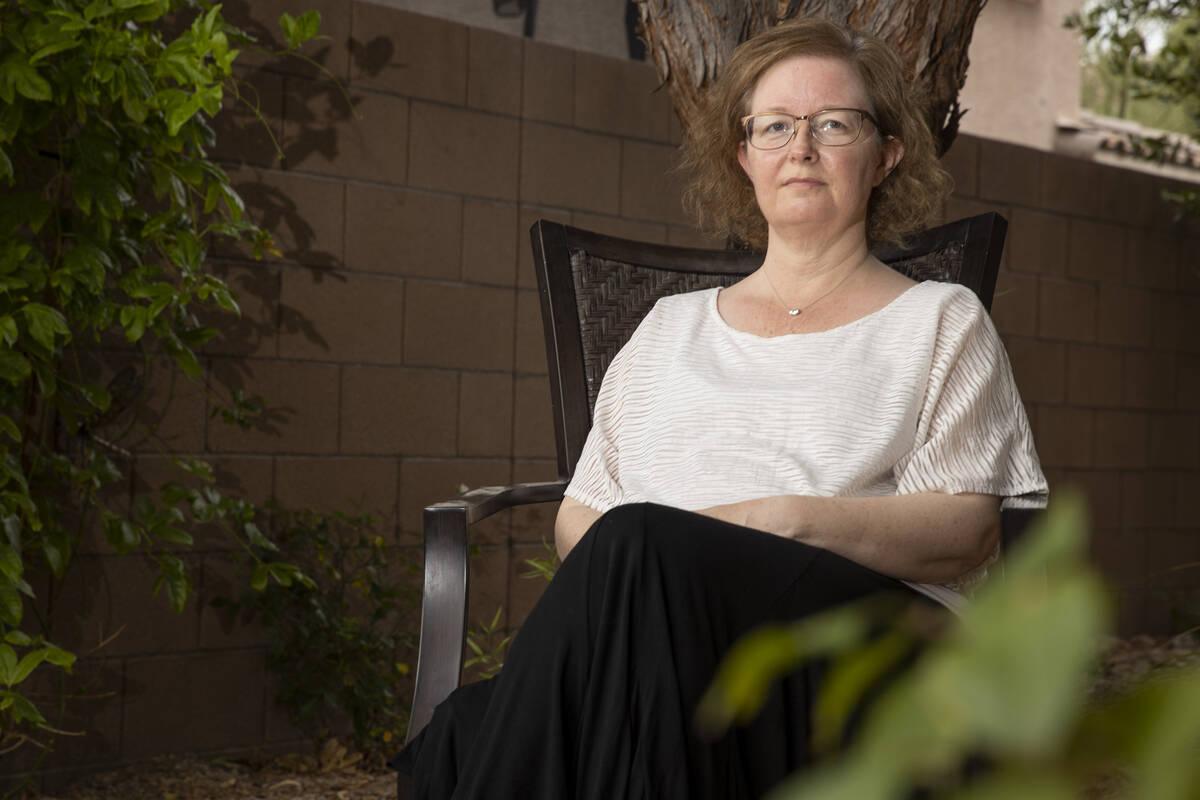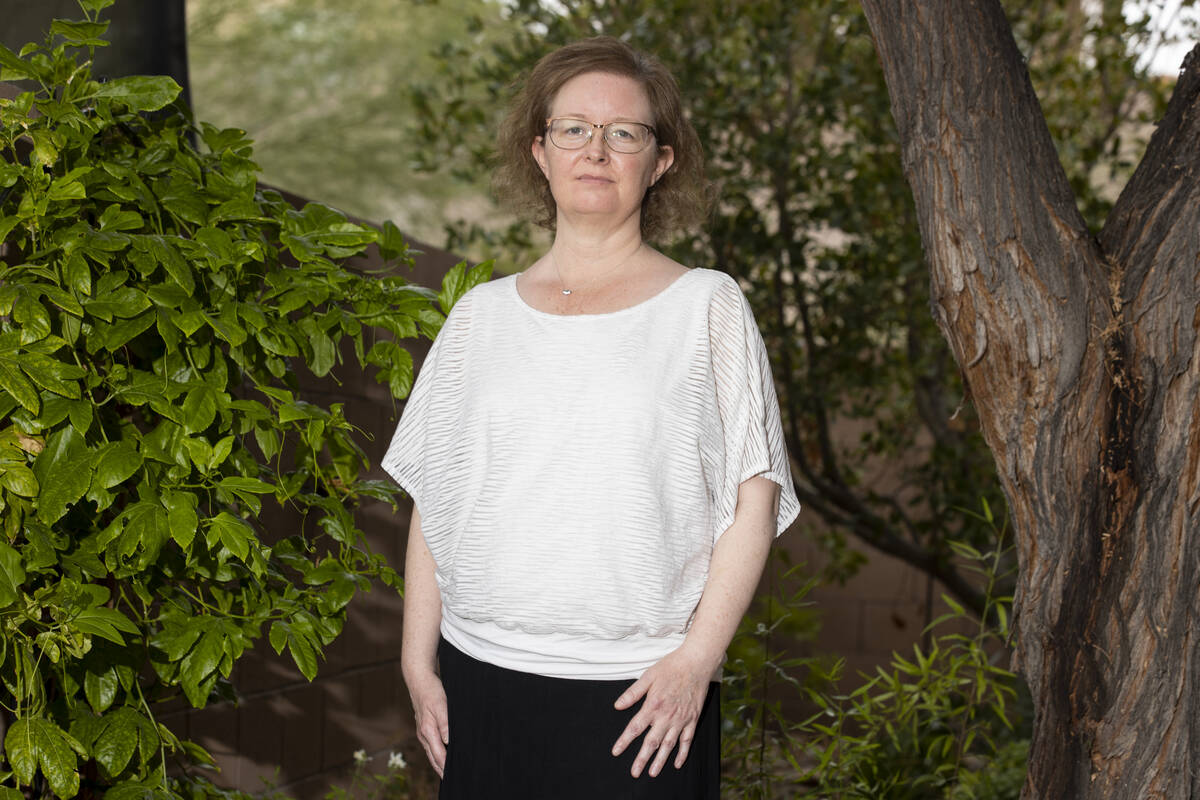New COVID-19 therapeutic drugs may be game-changers
Henderson resident Jullie Hoggan knew a free COVID-19 drug existed that could transform her life. Her challenge would be to find it.
In December, the U.S. Food and Drug Administration had authorized AstraZeneca’s Evusheld for emergency use in preventing COVID-19 in those with a compromised immune system, such as Hoggan. Drugs the 50-year-old takes to suppress her immune system after a kidney transplant place her at high risk for the disease.
Using the federal government’s online tool for locating COVID-19 therapeutics, she found an at-home-infusion company in Southern Nevada that said it would charge her $1,000 to administer the IV injection of monoclonal antibodies. The therapy, according to the government, is available to patients for free.
She wrote letters to the governor and state health department.
“Look, we the patients can’t get this stuff,” she recalls telling them. “Like, we’re trying. … We can’t get it. And I know it’s here.”
In response, the state pharmacy board delivered Evusheld to her doctor’s office free of charge in late January.
Since then, connecting patients with new therapeutics has gotten easier. A month ago, the state of Nevada opened a treatment center in Las Vegas for administering Evusheld and monoclonal antibody treatments Sotrovimab and Bebtelovimab. A state hotline now connects patients with telehealth providers who can prescribe treatment.
Meanwhile, the Southern Nevada Health District has begun to dispense antiviral pills, such as Paxlovid and Molnupiravir, for treating COVID-19. Both the monoclonal antibody treatments and the antivirals need to be taken early on in an infection.
Except for Evusheld, which prevents disease, these other therapeutics are authorized for emergency use in treating people with mild to moderate COVID-19 and are aimed at keeping them out of the hospital. They are reserved for those at high risk for progression to severe illness due to age (65 and older) or an underlying health condition, such as heart or lung disease, diabetes or obesity.
The state has authorized spending $19 million to provide the therapeutics free in Nevada. They are still under study and have not received full approval from the FDA.
The supply of the new drugs remains limited, though some authorities say the larger issue is that of getting available supplies to the people who need them the most.
‘Huge bottleneck’ for drug
Of the new treatments, Pfizer’s Paxlovid has shown the greatest effectiveness in studies, reducing hospitalizations and deaths by 88 percent. A course of the antiviral medication needs to begin within five days of the onset of symptoms.
The FDA authorized its use for both adults and children 12 and older weighing at least 88 pounds. A benefit is the ease of administering the medication, a combination of two different pills that can be taken at home. Providers need to use caution in prescribing the Paxlovid because it can interact with other common medications.
“I would love for everybody to get Paxlovid,” said Dr. Jason Dazley, an infectious disease specialist with the VA Southern Nevada Healthcare System. “The problem we’re seeing is there’s a huge bottleneck in accessibility on that one.”
Dazley said he could prescribe twice as much of the drug as it currently available.
Another antiviral pill available for out-patient use, Molnupiravir, developed by Merck and Ridgeback Biotherapeutics, was found to reduce hospitalizations and deaths by 30 percent. The FDA authorized the medication only for adults at risk for progressing to severe COVID-19 for whom alternative authorized treatments are inaccessible or medically inappropriate.
There are also two new monoclonal antibody therapies that have been found to be effective against the omicron variant, which caused the latest wave of COVID-19 that is now subsiding across the country.
Sotrovimab, developed by GlaxoSmithKline and Vir Biotechnology and authorized for both adults and children, has been found to reduce hospitalizations and deaths by 79 percent. It should be given as soon as possible after a positive test and within seven days of symptom onset.
A second monoclonal antibody treatment, Bebtelovimab by Eli Lilly and Co., was found to improve symptoms and reduce viral load. The FDA has authorized its emergency use for adults and children when other authorized treatments are inaccessible or inappropriate.
“We don’t have really good data behind that one,” said Dazley, who at this point is not prescribing Bebtelovimab. However, early data suggests it might be more effective against the omicron subvariant known as BA.2, he said.
Monoclonal antibody treatments from earlier in the pandemic are no longer in use because they did not work against the omicron variant, health authorities say.
The local VA is not yet equipped to administer Evusheld, the pre-exposure preventive medication, Dazley said.
Centralized treatment center opens
The Las Vegas treatment center, on Harmon Avenue near the Strip, offers monoclonal antibody therapeutics Evusheld, Sotrovimab and Bebtelovimab.
The center’s medical team can evaluate patients for possible treatment, and physicians can prescribe treatment for their patients, said Dr. Rashid Chotani, global medical director for AshBritt/IEM Health, which operates the Las Vegas center and similar centers across the country.
The center has at its disposal 500 courses of treatments per week, five or more times the amount it needs for current patient volumes.
The treatments are provided to patients free, without requiring evidence of insurance or documentation of immigration status, said Chotani, noting that the center has bilingual staff members.
“Problem is that a lot of people are afraid to come to a facility, you know, whether it is (for) a vaccine or testing or a monoclonal antibody infusion,” he said.
The treatments can provide peace of mind to a person at risk of severe COVID-19, he said. And receiving Evusheld can be life-changing for an immunocompromised person.
“I’m not saying these people can go wild and have parties,” he said. “But now they don’t have to be completely restricted and live in a bubble.”
Hoggan, the kidney transplant patient, did not develop any antibodies to ward off COVID-19 until she’d received four doses of vaccine. Two weeks after her first shot of Evusheld, testing showed that her antibodies had doubled, she said.
Patients are now recommended to receive not one but two shots of Evusheld. Following her second shot, administered at the Las Vegas treatment center, Hoggan said she experienced a new-found sense of freedom, having spent much of the pandemic restricted to her house, interacting with few people other than her husband and daughter.
Last weekend, she celebrated her 50th birthday by having a few friends over to spend time in her backyard.
Even better, they didn’t wear masks.
‘Not getting the uptake’
The Southern Nevada Health District has ample supplies of the antiviral pills Paxlovid and Molnupiravir, the former in short supply at Nevada pharmacies.
As of a week ago, it had distributed just 20 courses of Paxlovid and has several hundred courses on hand, said Dr. Cort Lohff, chief medical officer for the health district.
“We’re not getting the uptake we had hoped to see, certainly,” he said. “I’m not worried about exhausting our supplies,” but about getting medication to those in need.
Patients who have tested positive for COVID-19, either through a PCR test or through an at-home rapid test, can be evaluated at the health district for possible treatment. Lohff said that at-risk patients with symptoms of COVID-19 should get tested and evaluated as soon as possible.
“The Health District has a provider on stand-by to do a virtual consult with patients,” according to district representative Jennifer Sizemore.
A patient’s doctor can provide a prescription for an antiviral to the district’s pharmacy.
“My hope is that people will come to understand that this is obviously a much better option than getting a serious illness, or having to go to the hospital or even dying of this disease,” Lohff said.
This concept is not lost on Hoggan, who said she’d seek testing and treatment right away if she does develop symptoms.
If she tests positive, she said she’ll contact the Las Vegas treatment center about possibly getting Sotrovimab.
“I know I can call there, and they’ll be, like, ‘yes, you can come,’ instead of ‘maybe in a couple of weeks we’ll be able to get this to you,’” she said. “And that might be too late.”
Contact Mary Hynes at mhynes@reviewjournal.com or 702-383-0336. Follow @MaryHynes1 on Twitter.
Resources
State website: Information on COVID-19 treatment options and eligibility can be found at nvhealthresponse.nv.gov/find-treatment.
State call center: To discuss therapeutic options, call 800-401-0946 between 7 a.m. and 8 p.m. seven days a week.
Las Vegas treatment center: Open seven days a week from 8:30 a.m. to 4:30 p.m. at 150 E. Harmon Ave. Appointments can be made by physician referral, by calling 702-481-4209, and on a walk-in basis.
Southern Nevada Health District: Appointments for COVID-19 testing can be scheduled by calling 702-759-1354.
Those in need of a test, as well as those who have a positive test result and seek evaluation for a therapeutic, may go to the testing site at the district’s main location, 280 S. Decatur Blvd. Hours: 6 a.m. to 2:30 p.m. Monday through Friday.
Those who already have a prescription for a COVID-19 antiviral medication can go to the health district pharmacy at the main location. Pharmacy hours are 8:30 a.m. to 5:30 p.m. Monday through Thursday, and 8:30 a.m. to 5 p.m. on Friday.
























